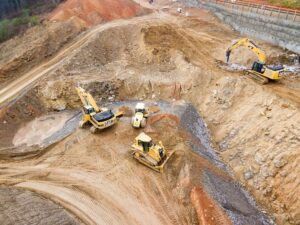Expert Mass Earthwork in Kentucky: Excavation & Site Prep
Mass earthwork lays the groundwork for every major commercial, residential and infrastructure development by moving, cutting and filling huge volumes of soil to create stable building platforms. In Kentucky’s varied terrain, inconsistent subsurface conditions and changing drainage patterns can delay schedules, inflate budgets and compromise foundations. Earth Works, LLC brings precision earthmoving techniques, GPS 3D modelling and machine control technology to solve these challenges, guaranteeing on-time delivery and structural reliability. This article defines mass earthwork, explains its key processes and benefits, surveys large-scale excavation and grading solutions, outlines site preparation methods, compares cost factors, and guides clients through contractor selection and planning. You will learn how mass earthwork supports commercial and residential projects, what equipment and grading methods ensure proper levelling and drainage, which site prep services build strong foundations, why Earth Works, LLC leads heavy civil earthmoving in Kentucky, and how to anticipate pricing and timelines for your next project.
What Is Mass Earthwork and Why Is It Essential for Kentucky Construction Projects?
Mass earthwork describes the large-scale removal, relocation and placement of soil and rock to prepare sites for foundations, roads and utilities. Integrating cut-and-fill balancing and bulk excavation ensures efficient land transformation, while precision grading creates engineered slopes and contours. This foundational work supports structural stability, prevents uneven settlement and establishes proper drainage, which is critical on Kentucky’s clay and loam soils. For contractors and project managers, understanding these processes reduces risk, accelerates schedules and improves long-term performance.
How Does Mass Earthwork Support Commercial and Residential Developments?
Mass earthwork supports commercial and residential developments by creating level platforms for buildings, parking areas and roadways. By cutting high spots and filling low areas, contractors achieve uniform grades that meet design elevations and reduce drainage issues. For shopping centres, apartment complexes and office parks, this process ensures that foundations rest on consistent soil bearing layers, minimising post-construction settlement. Well-executed earthmoving also prepares utility corridors, enabling seamless installation of water, sewer and storm-drain infrastructure.
What Are the Key Processes Involved in Mass Earthwork?
Key processes in mass earthwork include cut-and-fill operations, bulk excavation and fine grading to precise tolerances. Cut-and-fill uses balanced soil movement to minimise import or export of fill dirt, reducing hauling costs and environmental impact. Bulk excavation removes large soil volumes for foundations or road subgrades, while fine grading refines surfaces for paving or landscaping. Compaction follows each stage to achieve required density and prevent future ground movement.
How Does Mass Earthwork Improve Project Efficiency and Foundation Stability?
Mass earthwork improves efficiency by synchronising excavation and fill tasks, optimising equipment utilisation and reducing idle time. Precision grading technology with GPS guidance accelerates surface shaping to design contours, cutting rework and saving fuel. Foundation stability increases as uniform load-bearing zones are established on compacted subgrades, preventing uneven settlement and structural distress. Reliable earthwork practices pave the way for faster concrete pours and utility installation, streamlining overall project delivery.
Which Large-Scale Excavation Services Do Mass Earthwork Contractors in Kentucky Offer?
Contractors specialising in mass earthwork offer a spectrum of excavation services, including bulk excavation, trenching for utilities, foundation digging and rock removal. Each service demands different techniques, machinery and safety measures to handle soil types, groundwater conditions and existing structures. By grouping these offerings under one roof, clients benefit from streamlined coordination, consistent quality standards and single-point accountability throughout site preparation.
What Types of Excavation Are Common in Kentucky Earthmoving Projects?
Common excavation types include bulk excavation for general site cuts, trench excavation for water and sewer lines, foundation excavation for basements and footings, and rock excavation using hydraulic breakers or blasting techniques. Trench excavation requires careful shoring and dewatering to protect adjacent utilities and workers. Foundation pits demand strict depth and wall-stability controls to meet engineering specifications and local codes.
How Does Advanced Excavation Equipment Enhance Precision and Productivity?
Kentucky contractors leverage excavators with GPS-enabled machine control, bulldozers guided by 3D design models and motor graders for accurate slope work. This equipment reduces manual staking, accelerates surface sculpting and ensures elevation tolerances within a few centimetres. Operators track cut depths and fill heights in real time, avoiding overcutting and rework. As a result, project timelines shrink and operational costs drop.
3D Design Modelling for Machine Guidance in Earthworks Operations
In the contemporary construction era, visualising the site to be constructed is a requirement for every project. Despite its importance in the construction industry, 3D design visualisation is not commonly used for earthworks projects. However, demand for 3D earthworks design is increasing due to the need for detailed earthworks planning and its application in machine guidance systems. Over the last few decades, this technology has evolved and become a convenient tool in earthworks operations. This paper presents the methodology for creating 3D earthworks section design based on a parametric modelling technique. The Subassembly Composer, an Autodesk application, is used for creating the earthworks design sections according to site requirements. Four different case studies were conducted to review the proposed 3D design methodology and its application in excavator machine guidance systems. The earthworks sections, designed using this method, were found to be compatible with the machine guidance system. The objective of this research is to devise a simple and easy process to create complex earthworks sections for use in machine guidance systems for any project. The paper concludes by indicating the future potential of the research field.
3D design modeling application in machine guidance system for earthwork operations, WA Tanoli, 2018
What Are the Safety and Environmental Considerations in Excavation Services?
Excavation safety protocols include regular equipment inspections, trained operators, trench-shoring and emergency access planning. Environmental measures focus on erosion control, sediment fences and stabilized erosion mats to prevent soil runoff into waterways. Contractors also reuse excavated material where possible and monitor dust and noise levels to comply with local regulations and minimise community impacts.
Each excavation service targets a specific project need, combining appropriate machinery and methods to ensure safety, accuracy and environmental compliance.
How Do Mass Grading Solutions in Kentucky Ensure Proper Land Levelling and Drainage?
Mass grading shapes large areas to design contours that provide uniform slopes and effective stormwater flow. Grading prepares pads for buildings, roadbeds and playing fields by removing high points and filling depressions according to engineered plans. Effective grading balances cut and fill within a site, minimising haul distances and preserving native topsoil. Properly graded land reduces erosion, prevents standing water and establishes stable subgrades for subsequent construction phases.
What Are the Most Effective Site Grading Techniques for Kentucky Terrain?
Kentucky contractors use laser-guided grading and GPS-controlled motor graders for precise land levelling on varied topography. Laser transponders mounted on wheel graders provide continuous elevation feedback, allowing operators to maintain smooth, even surfaces. GPS control systems map digital site plans directly in the cab, translating design contours into real-time blade adjustments. These techniques accelerate grading accuracy, reduce manual checks and improve resource utilisation.
How Does Mass Grading Impact Drainage and Soil Stability?
Mass grading creates consistent drainage paths, directing runoff to swales, retention basins or storm drains. Engineered slopes of 1–5 per cent foster gravity-driven water flow, preventing pooling near foundations. Uniform compaction and contouring enhance soil stability by minimising erosion and promoting even moisture distribution. This dual focus on grading and compaction maintains subgrade integrity and safeguards site longevity.
What Factors Influence the Cost of Mass Grading Services in Kentucky?
Several factors drive mass grading costs, including site size, earthmoving volume, soil type, topographic complexity and access constraints. Clay soils often require more intensive compaction and moisture control, while rocky substrates add rock-excavation expenses. Distance to cut-fill balance points impacts hauling costs, and seasonal weather conditions can affect productivity. Detailed site surveys and digital modelling reduce budget uncertainty by optimising grading plans.
Accurate cost estimation hinges on site-specific data and advanced modelling tools that forecast volumes and resource needs before earthmoving begins.
What Comprehensive Site Preparation Services Are Included in Mass Earthwork Projects?
Site preparation encompasses land clearing, demolition, soil stabilisation, erosion control and utility trenching to ready a plot for construction. By coordinating these activities, mass earthwork contractors deliver turnkey solutions that reduce coordination challenges and ensure consistent workmanship. Integrating all site prep services under one contractor accelerates mobilization, streamlines permits and simplifies quality oversight.
How Is Land Clearing Performed for Construction Site Preparation?
Land clearing involves removal of vegetation, stumps, topsoil stripping and selective demolition of existing structures to expose the underlying grade. Heavy-duty mulchers shred brush and small trees, while excavator attachments extract stumps and roots. Topsoil is stockpiled for later use in landscaping, preventing nutrient loss. Demolition of old pavements or buildings uses controlled-explosion or mechanical methods to minimise dust and debris.
What Soil Stabilisation Methods Are Used to Improve Ground Conditions?
Soil stabilisation methods include mechanical compaction, chemical treatments with lime or cement, and biological techniques using vegetation mats. Mechanical compaction increases density through repeated passes with rollers or plate compactors. Chemical stabilisers react with clay particles to enhance load-bearing capacity and reduce shrink-swell potential. Vegetative erosion blankets and hydroseed mixes bind surface soils, preventing washouts on slopes and drainage channels.
How Do Site Preparation Services Support Utility Construction and Infrastructure?
Site preparation lays the groundwork for utility trenches, ensuring proper bedding, backfill and compaction for water, sewer and electrical conduits. Precise excavation of utility corridors prevents pipe misalignment and slope failures. After pipe installation, contractors backfill with engineered fill, compact in lifts and restore surface grades. This systematic approach minimises service interruptions and supports long-term infrastructure performance.
Why Choose Earth Works, LLC for Heavy Civil Earthmoving and Mass Earthwork in Kentucky?
Earth Works, LLC combines local Kentucky expertise with a fleet of GPS-equipped excavators, bulldozers and graders to execute projects with surgical precision. Their commitment to quality, reliability and on-time performance makes them a trusted partner for developers and general contractors. By integrating project management best practices and safety protocols, Earth Works, LLC delivers seamless earthmoving from initial survey to final grade.
What Advanced Technologies Does Earth Works, LLC Use for Precision Earthmoving?
Earth Works, LLC deploys GPS machine-control systems that link design models directly to equipment, enabling automatic blade adjustments and real-time grade checking. Drone surveying provides high-resolution topographic maps for accurate cut-and-fill calculations. Machine-mounted sensors track blade pitch and arm elevation, ensuring tolerances within centimetres without constant manual verification.
How Does Earth Works, LLC Manage Large-Scale Projects Across Diverse Kentucky Terrains?
With experienced project managers and local crews familiar with Kentucky’s soil variations, Earth Works, LLC adapts workflows to seasonal moisture conditions and site access challenges. Detailed work plans align equipment sequencing, material staging and safety measures to minimise downtime. Regular field inspections and digital progress reports keep stakeholders informed and budgets on track.
What Types of Commercial and Infrastructure Projects Has Earth Works, LLC Completed?
Earth Works, LLC has executed earthmoving for retail centres, multi-family housing sites and manufacturing plants, as well as infrastructure projects such as road realignments, bridge approaches and utility corridors. Their portfolio demonstrates adaptability to tight urban sites and large rural developments, showcasing successful foundation prep for buildings, highways and drainage networks.
How Are Mass Earthwork Services Priced and What Factors Affect Costs in Kentucky?
Mass earthwork pricing reflects the complexity of site access, earthmoving volumes, equipment mobilisation and soil conditions. Contractors calculate unit rates for excavation, grading and compaction based on cubic metre quantities, expected productivity rates and machine operating costs. Clear project scopes and early scheduling help avoid change orders and budget overruns.
What Are the Main Cost Drivers for Excavation and Grading Services?
Major cost drivers include machine hours, labour rates, material disposal or import fees, and soil compaction requirements. High moisture content in soils often increases compaction cycles and equipment fuel consumption. Extended haul routes for off-site material disposal add trucking costs. Efficient balancing of cut and fill on-site reduces import/export expenses.
How Can Project Planning Reduce Mass Earthwork Expenses?
Early-stage digital modelling and survey data enable contractors to optimise cut-fill balancing and select cost-effective hauling routes. Phased grading schedules align with foundation pours and utility installation to minimise rework. Collaborative planning workshops between owners, engineers and contractors uncover synergies in site logistics and scheduling.
What Should Clients Expect in a Mass Earthwork Service Quote?
Clients should receive transparent quotes detailing quantities (cubic metres), unit rates for earthmoving, grading and compaction, plus line items for mobilisation, erosion control and permit management. Well-structured proposals include assumptions on soil conditions, site access and project duration. This clarity supports accurate budgeting and informed decision-making.
What Are Common Questions About Mass Earthwork Contractors and Services in Kentucky?
Clients often ask which heavy machinery will arrive on site, how long projects take, what environmental safeguards are in place and how to prepare before mobilization. Addressing these concerns upfront builds confidence, improves coordination and ensures readiness for construction.
What Equipment Do Mass Earthwork Contractors Typically Use?
Contractors deploy a mix of excavators, bulldozers, motor graders, wheel loaders and rollers for efficient earthmoving and compaction. GPS-enabled excavators maintain consistent cut depths, while dozers rough-grade large areas. Graders finish surfaces to design slopes, and compactors ensure subgrade density meets engineering standards.
How Long Does a Typical Mass Earthwork Project Take?
A medium-sized grading and excavation project of 10,000 square metres often completes in four to six weeks, depending on site complexity, weather and permitting timelines. Bulk excavation may require one to two weeks, followed by grading and compaction phases. Concurrent utility trenching and erosion control installation can overlap to accelerate overall delivery.
How Do Mass Earthwork Contractors Ensure Environmental Compliance?
Contractors implement erosion-control measures such as silt fences, sediment basins and mulch blankets to capture runoff. They monitor turbidity in adjacent waterways and adjust operations to prevent sediment discharge. Reusing clean excavated fill on site reduces landfill impact and preserves topsoil for landscaping.
How Can Clients Prepare for a Mass Earthwork Project?
Clients should complete permitting, site surveys and utility locates in advance, clear access routes and establish staging areas for equipment and materials. Providing up-to-date plans and coordinating with neighbouring property owners minimises delays. Early site visits with the contractor ensure expectations for traffic management, erosion control and safety protocols are aligned.
Earth Works, LLC’s precision earthmoving and comprehensive site preparation capabilities uniquely position them to support Kentucky contractors and owners in delivering durable, cost-effective foundations. Their advanced equipment, local expertise and rigorous project management ensure mass earthwork processes are efficient and reliable. By leveraging cutting-edge GPS 3D modelling, systematic cut-fill balancing and environmentally responsible practices, clients achieve stable subgrades and smooth construction progress. Plan early, request detailed proposals and partner with Earth Works, LLC for your next large-scale excavation or grading project in Kentucky.


